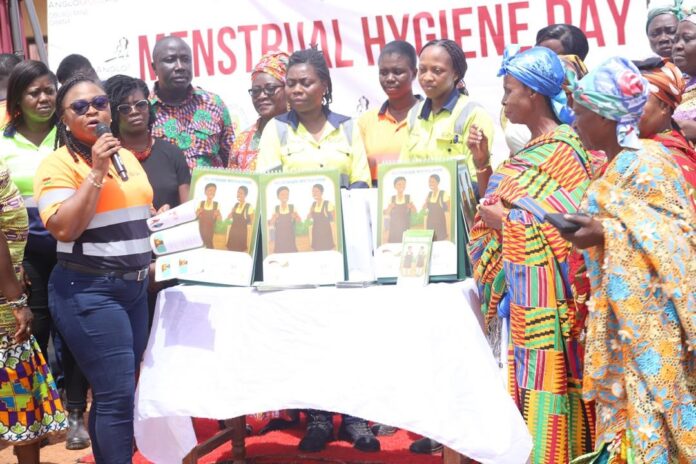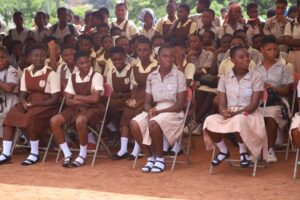
AngloGold Ashanti Obuasi Mine, has donated three thousand, five hundred and thirty sanitary pads to female students in Obuasi and Obuasi East, demystifying myths surrounding the menstruation in Ghanaian settings.
Generally, it intends to distribute 12,500 sanitary pads to junior high school female students in its catchment areas that are Adansi North and Amansie Central.
This gesture, will be presented to 49 schools in the above-mentioned areas to final year female students, who are due to sit for their Basic Education Certificate Examination (BECE).
Held under the theme “Together for a #PeriodFriendlyWorld.” at Independence School Park, Brahabebome, Obuasi, the event brought hundreds of female students together.
In a statement read by Mavis Nana Yaa Kyei, Social Development and Gender Superintendent at the AGA Obuasi Mine, she disabused the minds of the young ladies about societal menstruation myth, saying menstruation is a natural and normal process that half of the world’s population experiences.
Yaa Kyei expressed worry about menstrual challenges such as shame, embarrassment, and lack of access to proper hygiene products, which are associated with menstruation.
She emphasized that menstruation health is a human right and that lack of proper menstruation worsens the plight of women economically, a challenge which is mostly found in developing countries.

Attributing a quotation to the United Nations Population Fund (UNFPA) Mavis Nana Kyei said, “Menstrual health is a human rights issue, not just a health one and everyone has the right to bodily autonomy or independence as the ability to care for one’s body while menstruating, is an essential part of this fundamental freedom.”
She noted that although the menstrual hygiene campaigns have made significant progress over the years, however, there are still many more women and girls facing several difficulties in managing their periods because they lack access to menstrual products and adequate facilities for menstrual health.
In a message read on behalf of the District Chief Executive (DCE) for Obuasi East, Faustina Amissah, she noted that nothing stops female from menstruating and that should not be seen as an excuse to female empowerment.
According to her, menstruation is a development that weighs down ladies so they are using this programme to educate them about menstruation.
The DCE told the students that menstruation is part of the female system and during such period, it doesn’t mean women should back down for men to overtake them.
She, however, expressed worry that owing to high cost of sanitary pads, some ladies are unable to be in the classroom during such periods.
In an event which was equally attended by male students, Dr. Bernadette Osei Kuffour, a senior medical health officer at the AGA Health Foundation (AGAHF), educated the students on what she described as the four components of menstruation namely: Cycle length, Duration of your flow, Regular or irregular and the flow.
Fighting misinformation about menstruation, the senior medical officer, mentioned that each lady has a unique body and the inability of one person to produce more flow could not be fibroid as it has been speculated.









